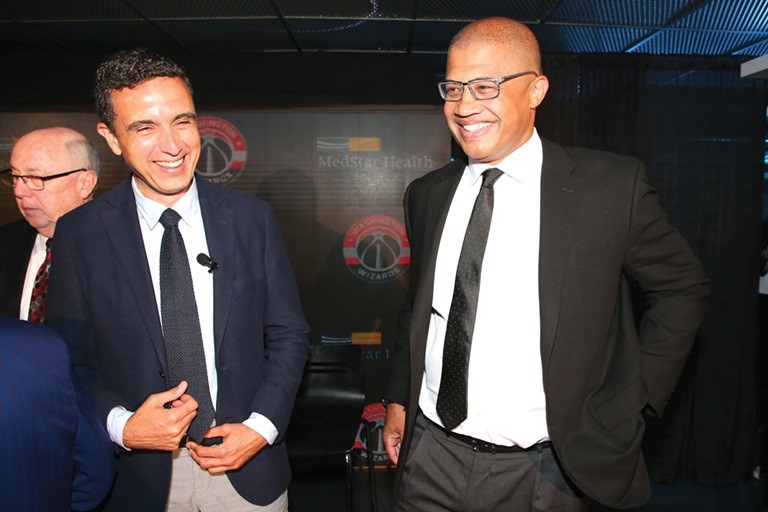Via Sports Business Journal
Like everyone in America these days, there’s a new reality for team doctors. Generally, they aren’t seeing their pro athlete patients, and their surgery schedule has declined nearly to the extent of commercial airline travel, which is down by more than 90% nationwide. Still, at any hospital, things are palpably different, even outside of the emergency rooms and ICUs that are generally filled with coronavirus victims with respiratory ailment.
Pre-corona, Dr. Harlan Selesnick, an orthopedist who is the longtime team physician for the Miami Heat, used to see as many as 40 patients a day. Now, he might have five or fewer in-person examinations daily. With electives now forbidden, his surgery schedule has plummeted from eight to 10 per week to one or two operations every two weeks. When Selesnick does perform in-person exams, both he and the patient are wearing masks. When he does work at a hospital, the doctor goes through the same routine as any patient, answering questions about where he has traveled and having his temperature checked. Talk about a new normal.
“We’ve really never had to adopt precautions like this,” said Selesnick, affiliated with Baptist Health South Florida. “This is something you’d read about in a medical school textbook, but you never thought you’d would actually see. It’s a scary time.”
As an ER physician, Dr. Elizabeth Delasobera is on the front lines. She supervises 14 urgent-care facilities in the Washington, D.C./Baltimore area for MedStar and is in her fifth year as the Washington Capitals’ team doctor. She describes Georgetown University Hospital as being eerily quiet, “much more so than usual, but the areas that aren’t are the ERs and ICUs on floors where we have the respiratory patients. That feels a little bit scary, just with the unknown and the acuity and severity of this illness, and of course everyone is geared up with masks, gowns and other protection even in young/healthy people. There’s no lightheartedness anymore — it’s a palpable level of seriousness.”
For now, the rush to hospitals around D.C. hasn’t reached the acute levels of New York City, where temporary hospitals have been built in parks and sports facilities. “Generally, volumes in our ERs are actually lower than they would be during cough/cold/flu season, because everyone is staying home, unless they absolutely have to be seen,” she said. “What we are seeing is people with cough or fever at home for many days trying to avoid coming to a hospital. And so when they do, they are a lot sicker than they normally would be.”
“Every company is trying not only to find that new normal but even when that new normal is more permanent,” said Marc Bluestein, founder and CEO of Aquarius Sports & Entertainment, the AOR for Baptist Health South Florida and Virtua Health. “Hospitals and health systems have to adjust faster than any, since they are at the forefront.”
Of any profession, you’d think doctors would have a hard time maintaining “social distance.” As Monumental Sports Chief Medical Officer Dr. Wiemi Douoguih put it, lines and crowded waiting rooms are now anachronisms. For now, so are handshakes and hugs.
“Everyone’s on edge, there no question about it,” he said. “What we are trying to do is prevent panic and help care for and educate people so they can take the best measure themselves … but it’s really a scary disease.”
Douoguih is only treating urgent or emerging cases in person. “Everything else is either digital or by telephone,” he said. Accordingly, the only positive development out of the pandemic is that it has advanced telemedicine from an aspiration to a reality.
“We’ve been talking about trying to do telemedicine for five years and we accomplished in five days recently what we weren’t able to do in five years as far as adopting telemedicine,” said Dr. Scott Boden, who heads Emory’s Orthopaedics & Spine Center and serves as vice president for business innovation for Emory Health Care, Atlanta. Emory Health Care is affiliated with all of that city’s pro sports teams and has had naming rights to the Hawks’ training facility since 2017.
At Emory, Boden has divided his entire staff of doctors, nurses and medical secretaries into two teams. Each team works for a week, while the other is in isolation — all to prevent contagion.
“I am 1,000% sure that once we have a vaccine and some known treatments, then you will see people getting back to normal,” he said. “Short of that, older people and those with underlying conditions will probably still be at home.”
As a South Florida resident, Selesnick has lived through his share of hurricanes, but “when you have a hurricane, you can prepare and you have some idea of how long it will take to rebuild. Not knowing whether this will be one month or six months is what’s most stressful for people. We just don’t know when we can get back to normal.”

